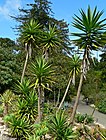Note: This is a project under development. The articles on this wiki are just being initiated and broadly incomplete. You can Help creating new pages.
Yucca aloifolia
Yucca aloifolia is an erect, succulent, evergreen tree growing up to 8 metres tall. The plant forms 1 - 3 main stems, each topped by a rosette of spear shaped leaves 12 - 40cm long and 25 - 60mm wide. The stem can be free of branches, but is sometimes sparsely to densely branched. The plant has a wide range of traditional uses, providing food, medicines and a range of commodities. It is harvested from the wild for local use. A very ornamental plant, it is often grown in gardens.
Uses
[[:Category:Ayurvedic Herbs known to be helpful to treat |]], [[:Category:Ayurvedic Herbs known to be helpful to treat |]], [[:Category:Ayurvedic Herbs known to be helpful to treat |]], [[:Category:Ayurvedic Herbs known to be helpful to treat |]], [[:Category:Ayurvedic Herbs known to be helpful to treat |]], [[:Category:Ayurvedic Herbs known to be helpful to treat |]], [[:Category:Ayurvedic Herbs known to be helpful to treat |]], [[:Category:Ayurvedic Herbs known to be helpful to treat |]], [[:Category:Ayurvedic Herbs known to be helpful to treat |]], [[:Category:Ayurvedic Herbs known to be helpful to treat |]], [[:Category:Ayurvedic Herbs known to be helpful to treat |]].
Parts Used
Chemical Composition
Common names
| Language | Common name |
|---|---|
| Kannada | |
| Hindi | |
| Malayalam | |
| Tamil | |
| Telugu | |
| Marathi | |
| Gujarathi | |
| Punjabi | |
| Kashmiri | |
| Sanskrit | |
| English |
Properties
Reference: Dravya - Substance, Rasa - Taste, Guna - Qualities, Veerya - Potency, Vipaka - Post-digesion effect, Karma - Pharmacological activity, Prabhava - Therepeutics.
Dravya
Rasa
Guna
Veerya
Vipaka
Karma
Prabhava
Habit
Identification
Leaf
| Kind | Shape | Feature |
|---|---|---|
Flower
| Type | Size | Color and composition | Stamen | More information |
|---|---|---|---|---|
| {{{5}}} |
Fruit
| Type | Size | Mass | Appearance | Seeds | More information |
|---|---|---|---|---|---|
Other features
List of Ayurvedic medicine in which the herb is used
Where to get the saplings
Mode of Propagation
How to plant/cultivate
A plant of the warm temperate to tropical zones, usually found at low elevations. It tolerates occasional temperatures down to about -10°c if in a suitable site.[3]
Commonly seen growing in areas
Photo Gallery
References
- ↑ [Chemical constituents]
- ↑ [Morphology]
- ↑ Cultivation
External Links
- Ayurvedic Herbs known to be helpful to treat
- Herbs with Fruits used in medicine
- Herbs with Flowers used in medicine
- Herbs with Flowering stem used in medicine
- Habit - Evergreen tree
- Index of Plants which can be propagated by Seeds
- Index of Plants which can be propagated by Root cuttings
- Herbs that are commonly seen in the region of Sand dunes of the coast
- Herbs that are commonly seen in the region of Pine forests
- Herbs





